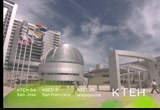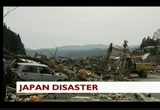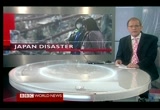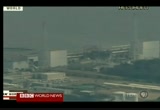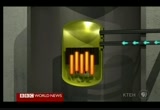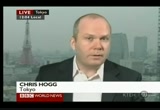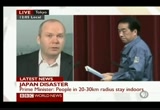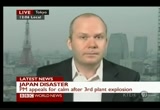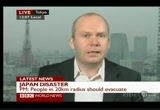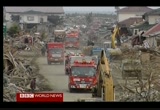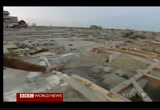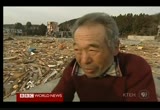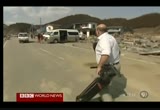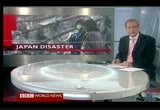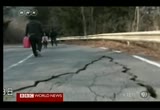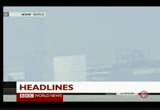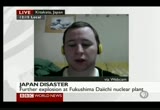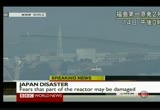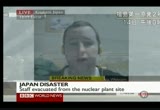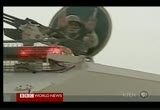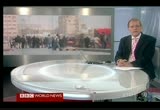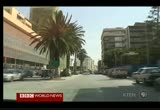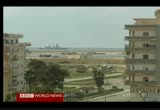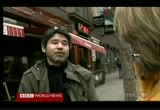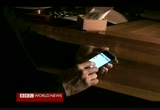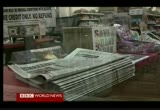tv BBC World News PBS March 15, 2011 12:30am-1:00am PDT
12:30 am
>> this is "bbc world news." funding for this presentation is made possible by the freeman foundation of new york, stowe, vermont, and honolulu, newman's own foundation, the john d. and catherine t. macarthur foundation, and union bank. >> union bank has put its financial strength to work for a wide range of companies, from small businesses, to major corporations. what can we do for you?
12:31 am
>> and now, "bbc world news." >> japan's prime minister appeals for calm after a third explosion at the fukushima daichi. naoto kan said everyone within 20 kilometers should leave immediately. >> we need now for everybody to move out of the 20 kilometer radius from the number one plant. >> in cities and towns reduced to rubble by the tsunami which followed the earthquake, the death toll could be as many as 10,000. a country still literally shaken by the aftershocks is coming to grips with the recovery effort. it will take years and an immeasurable income impact. become to "bbc world news." broadcasting in the u.k. and around the world. in this program, confrontation in bahrain. protestors set up road blocks in the capital as 1,000 saudi troops enter the country, and the u.n. security council
12:32 am
discusses a no-fly zone over libya but nothing is agreed. member states are too divided. there's been a third big explosion at the fukushima power plant in japan which was badly damaged by friday's earthquake and tsunami. a four-fold increase in radiation levels has been released into the air surrounding the plant. the prime minister said everyone within 20 kilometers of the plant should leave the area immediately. >> the bottom of the screen concerns the latest grave development, a third explosion in as many days at the stricken fukushima installation, and this time, officials fear some radiation may have leaked out. >> number 2 reactor at 6:14
12:33 am
a.m., there was a blast heard near the suppression pool, and the pressure began to fall in the suppression pool. we are continuing the water injection into the pressure vessels but the operators not directly engaged in this operation are being ordered to be evacuated to safer locations. >> the news that staff had been moved from the site demonstrates how seriously the authorities are taking the threat. >> we need now for everybody to move out of the 20 kilometer radius from the number one plant and in areas from 20 to 30 kilometers from the power plant depending on what happens at the power plant, we would like to ask you to remain indoors, at home, or in your offices. >> the installation itself was
12:34 am
battered by the tsunami. this picture was taken before the disaster and here it is just after with much of the site blackened with mud. and this was it on monday with some of the reactor buildings destroyed. what's meant to happen inside a nuclear power station is this, in the reactor, the rods of nuclear fuel go through the process of fission with the atoms splitting and releasing energy. water is pumped in and flows around the fuel where it heats up and turns to steam, which then drives generators to make electricity. but if a reactor runs dry, the fuel rods overheat and melt and that may have started in three reactors. the nuclear fuel could sink to the bottom of the reactor, beginning what's called "meltdown." so the suggestion that the steel wall of the container may have been damaged by this latest blast means fears of a radiation leak are now stronger.
12:35 am
>> let's get the very latest for you now from tokyo, our correspondent is joining us. tell us more if you can about this four-fold increase in the radiation levels which has been announced. how will that affect human health? >> well, in fact, it could be even higher than that. since we last spoke, we heard from a chief cabinet secretary and there is one report on one of the japanese news agencies 4ká site itselfwe3d and thismç ise
12:36 am
12:37 am
the best way to reduce the exposure to radiation is to stay indoors. >> what will be concerning, as well, is the meteorological office is saying that the winds are blowing southwesterly, which ties into what you said about the area near tokyo, taking the ridiation towards you. >> yes, but i think what's very difficult for us to get a handle on is whether these are brief spikes or whether this is something that is more sustained and that's what they'll be
12:38 am
working on now. they'll be looking to give a more accurate forecast of what the risk is in different places. and where those places are. certainly the advice at the moment is simply -- the official advice from the japanese government is that if you are within the 20 kilometer zone, you need to leave and if you're between 20 and 30 kilometers, you need to stay indoors, but that's still a long way away from tokyo and they haven't given different advice to the capital city as yet. >> many thanks, indeed, reporting live from tokyo. with nuclear concerns rising in the coastal area near the quake's epicenter, the scale of the disaster is still coming to light. the death toll is expected to rise well above 10,000 and at least half a million have been left homeless. one of the areas most affected is that around sendai and it's
12:39 am
from there that our correspondent filed this report. >> the road to uriaki, a journey to a place no longer there. once a pleasant fishing port is now gone. heading into, more than teams from all over japan but there's little for them to find except bodies. >> people used to come here to rent bicycles and cycle along the seaside, but at 2:46 on friday afternoon, the town was wiped from the map. >> live footage as the tsunami has struck the area. >> the tsunami swept in here and the homes, most of which were made of wood to withstand earthquakes, were torn to pieces
12:40 am
by the power of the wake. it's hard to believe that 7,500 people used to live here. where i'm standing, these are the steps up to someone's house. this was the porch and the foundations are all that remain. every patch here was a home to another family, all obliterated. what's left here, a book, bits of a doll, a lamp and a coffee maker. that's it. >> it's a nightmare. i want it to be a dream. this is where i was born, my granddad and his dad, generation after generation, but it seems impossible that life can ever return here. >> sadly, those scenes of destruction are all too familiar along japan's northeastern coast. in one town alone, 10,000 people are still unaccounted for. the town was completely wiped
12:41 am
out by the massive tsunami. our bbc correspondent sends us this report. >> it's calm now but there are many clues along this coastline of the violence these waters and the earthquake below them brought to japan. >> the waves just kept coming and coming, this fisherman said. he raced from his boat up the hill as a wall of water crashed into the bay. its impact was immediate and devastating. those who didn't make it to high ground were swept away with the whole town. the wave was more than three stories high. the railway line and bridge, tossed aside. cars, crushed or dumped on top of buildings. boats, marooned far inland. the tsunami warning came, but for many here, there was just
12:42 am
not enough time. it's taken days for the roads along the coast to be cleared of debris. some have come back to see what they could salvage. as we filmed them, there was panic as word spread of another tsunami. >> something came up the hill. they said there was another tsunami coming and everyone was running there to as high of land as possible. we don't know if it's coming or not but it's too risky not to run. it didn't come, but regular aftershocks don't help people's nerves. it's impossible to know just how many people are buried here among the tons of mud, wood and twisted metal. it's been called japan's worst tragedy since world war ii. >> stay with us. still ahead on this program for
12:43 am
you, this confrontation in bahrain, protestors set up road blocks in the capital as 1,000 saudi troops entered the country. the bank of japan has channeled another $61.2 billion into the financial system to help stabilize the country's economy. the move comes a day after the bank injected 15 trillion yen into japan's economy to shore up investor sentiment. >> mass selling on the tokyo stock exchange as investors try to guess how badly japan's major companies will be hit. firms like toshiba, toyota, and nissan have had to stop production because with 11 of japan's 54 nuclear power stations out of action, they're running out of energy. >> we've stopped production as of today. we're taking the opportunity to assess how affected each operation is.
12:44 am
frankly, it's extraordinarily complex. it's not just our factories, it's also our suppliers. obviously, some of the suppliers are within the exclusion area for the nuclear plant. >> it's insurance companies that are hardest hit. it's estimated that the physical damage from the japanese earthquake and tsunami will cost $51 billion to repair and the total cost to the economy from that and lost production could total $99 billion. that would make this disaster about as costly as hurricane katrina in new orleans in 2005. >> one of the things we know about the japanese market is it tends to keep a lot of its exposures within the domestic japanese insurance market so i think they will bear a brunt of it but once it gets to a certain level, the losses will be shared amongst the international community and we'll see if foreign currencies will pick up
12:45 am
a chunk of it. >> empty shelves on the food stores and the government says it will have to impose power cuts. the bank of japan is aware how badly all this could shake people's confidence in the economy. jeremy howell, bbc news. >> welcome. if you're just joining us, this is bbc news. japan's prime minister appeals for calm after a third explosion at the fukushima nuclear plant. radiation levels are 400 times the legal limit of that plant and everyone within 20 kilometers of that plant are urged to leave immediately. police in japan believe 10,000 people may have lost their lives in the northern coastal area. joining us now from the northern city and 120 miles inland from the fukushima power plant is an
12:46 am
english teacher living in japan. i understand you've moved away from the nuclear plant already. what are your concerns now? >> mainly concerned whether or not i'm far enough. we've just been told the news about not only having trouble with reactor 2, but reactor 4, which everyone thought would be stable, is now throwing out radiation, as well. the exclusion zone has been expanded slightly. everyone within 20 kilometers has to evacuate immediately. everyone within 30 kilometers has to stay indoors no matter what. we're advised to dust ourselves off of radioactive particles, keep dry clothes inside. if anything is outside, not to go outside to treat it. we're told to stay inside at all costs if you live within 30
12:47 am
kilometers. >> that is what the prime minister is advising, staying indoors for the time being but that's tricky in order to maintain life indoors. you're 120 kilometers away so presumably food and water is available at the moment? >> it is strangely normal here. food is getting a little bit scarce, and petrol has run out. it's been divvied out to emergency services but as you move further east, if you go to coyiama, water isn't running and gas has been turned off. you have to stay indoors at all times which is a very big problem if you don't have any water. >> clearly, at some point, you need to get out of doors. we're obviously watching this case of the radiation spreading. we're saying that the plant at
12:48 am
fukushima has radiation levels possibly 400 times the legal limit and winds are blowing southwesterly at the moment from there. so, tell us what you're hearing from people around you there and how they're feeling. >> everyone is obviously extremely tense about the situation. we're being told that the levels of radiation coming out are enough to make a person infertile, for example. there are obvious health connotations attached to this now. it can powerfully impact human health. as for the spread of radiation, we don't know how far it can spread. it will depend on the wind. >> we wish you well. thanks for joining us from japan. now let's just move on to some other news for the time being. troops from arab gulf states have moved to bahrain to help the government contain pro-democracy demonstrations. the movement has seen the
12:49 am
arrival of foreign troops and a declaration of war. >> an extraordinary convoy, saudi armed forces rolling into bahrain across the causeway that links the two gulf kingdoms. it's extraordinary because this is the first time an arab regime has asked for the support of foreign troops and it suggests bahrain's ruling royal family isn't sure it can hang on to power without their help. saudi arabia says it has deployed 1,000 troops, all this in response to mounting protestors in bahrain's streets. clashes between bahrain's protestors and police spread yesterday after a month of confrontation. on one side, demonstrators from bahrain's majority community, shia muslims, and on the other, forces defending the power of the minority community, the sunni muslims, to control parliament and make up the elite around the dominant sunni royal
12:50 am
family. more than anything, this is a sectarian clash about the dominance of bahrain's king and his ruling family. they hold the main political and military posts. some protestors want the royal family gone, replaced by a republic. others insist they can stay provided real power passes to the people. bahrain television read a statement by the country's crown prince insisting the way is open to national dialogue, but the opposition regard the arrival of foreign forces as provocation. >> we say to our brothers in the gulf, your army is welcome when our country faces danger from outside. but we will consider you part of an occupation when you come to oppress the people. >> bahrain is home to the united states fifth fleet, so trouble worries washington. the state department is calling for all armed forces in bahrain to support dialogue, not to
12:51 am
suppress legitimate protests. but the arrival of foreign troops could change the nature of this power struggle and it risks deepening, not healing, divisions. >> in libya, troops loyal to colonel qaddafi are continuing to advance eastward into areas held by the rebels. opposition forces say they've come under attack in the key towns and there are reports that colonel qaddafi's forces have retaken the small coastal town of zuwara. >> the front line is confused but slowly colonel qaddafi's forces seem to be pushing towards the main rebel-held towns. after the oil town of brega is the much bigger challenge of ajdabiya, the last town before benghazi. at a news conference in benghazi, the opposition unveiled their top military
12:52 am
commander, colonel qaddafi's former interior minister. he accepted that the war was entering a crucial phase. >> the battle is very important for us. we feel that the enemy will have serious logistical problems in supplying troops. >> what about benghazi itself? surely colonel qaddafi does not have enough troops to attack this city of a million people and would he use airpower against the civilian population here? many of the fighters at the city's hospital were injured in attacks by colonel qaddafi's warplanes. this man was wounded in an air strike on friday in an area since recaptured by the government and now 100 miles from the front line. this man has lost a hand after he was caught in another air strike in the oil town of brega. the surgeon treating him had one simple message.
12:53 am
>> i want no-fly zone because the no-fly zone will decrease the number of people that are injured or killed. >> most of the casualties we're seeing here are fighters. many have been caught up in air attacks. as the fighting gets closer to this major city of benghazi, there is the potential for many more civilian casualties, particularly if colonel qaddafi's aircraft operate unchecked. this is one of many western warships to visit benghazi recently. everyone is watching to see if the west engages actively to curb colonel qaddafi's forces. >> now back to japan and around the world there's been an amazing outpouring of support for those affected by the earthquake and tsunami. from international rescue teams to individual donations, millions of reaching out to help. but in the united states, it's been a tense wait for some japanese-americans who still
12:54 am
haven't heard from family and friends who lived in the hardest hit areas. this story from new york. >> it's an anxious time for new york's japanese community. those who came here to make a new life are now consumed by the crisis back home. in the east village, i met takeshi, who, like so many others, is watching what's going on with a growing sense of unease. >> most of my worries are my friends. >> have you heard anything from your friends? >> no. i tried to reach him maybe 10 times, calling and emailing, but, no response. >> it's been an agonizing few days for the japanese community in new york. first, the shock of what happened, and then the waiting. communications are poor and news of friends and loved ones is hard to come by. online, the search for japan's
12:55 am
missing goes on with friends and family posting descriptions of loved ones. after four days, news is beginning to get through, bringing both grief and relief. the east village is home to this traditional restaurant where fish is cooked in the sendai style. the manager was desperately worried about his wife's parents who live near sendai, closest to the epicenter of the earthquake, but last he got news via twitter. >> they're all right, in their house. so that was the morning, like 5:00 in the morning, i got information from the internet. >> bonyagi has at last managed to talk to his aging parents. >> yesterday, we had a phone conversation with my mother, you know, who is old, 94.
quote
12:56 am
so i couldn't contact for three days. and finally we did and she was safe, so -- but if i think about the other people, over 10,000 people missing, it's kind of worry, and i worry about the economy, also. >> seeing -- being nearly 7,000 miles away from the devastation leaves many feeling helpless. fund-raising is something that can be done amid the waiting and the hoping. >> and there's much more about japan on the bbc web site. radiation levels at
12:57 am
>> see the news unfold. get the top stories from around the globe and click-to-play video reports. go to bbc.com/news to experience the in-depth, expert reporting of bbc world news online. >> funding was made possible by, freeman foundation of new york, stowe, vermont, and honolulu, newman's own foundation, the john
12:58 am
260 Views
Uploaded by TV Archive on

 Live Music Archive
Live Music Archive Librivox Free Audio
Librivox Free Audio Metropolitan Museum
Metropolitan Museum Cleveland Museum of Art
Cleveland Museum of Art Internet Arcade
Internet Arcade Console Living Room
Console Living Room Open Library
Open Library American Libraries
American Libraries TV News
TV News Understanding 9/11
Understanding 9/11